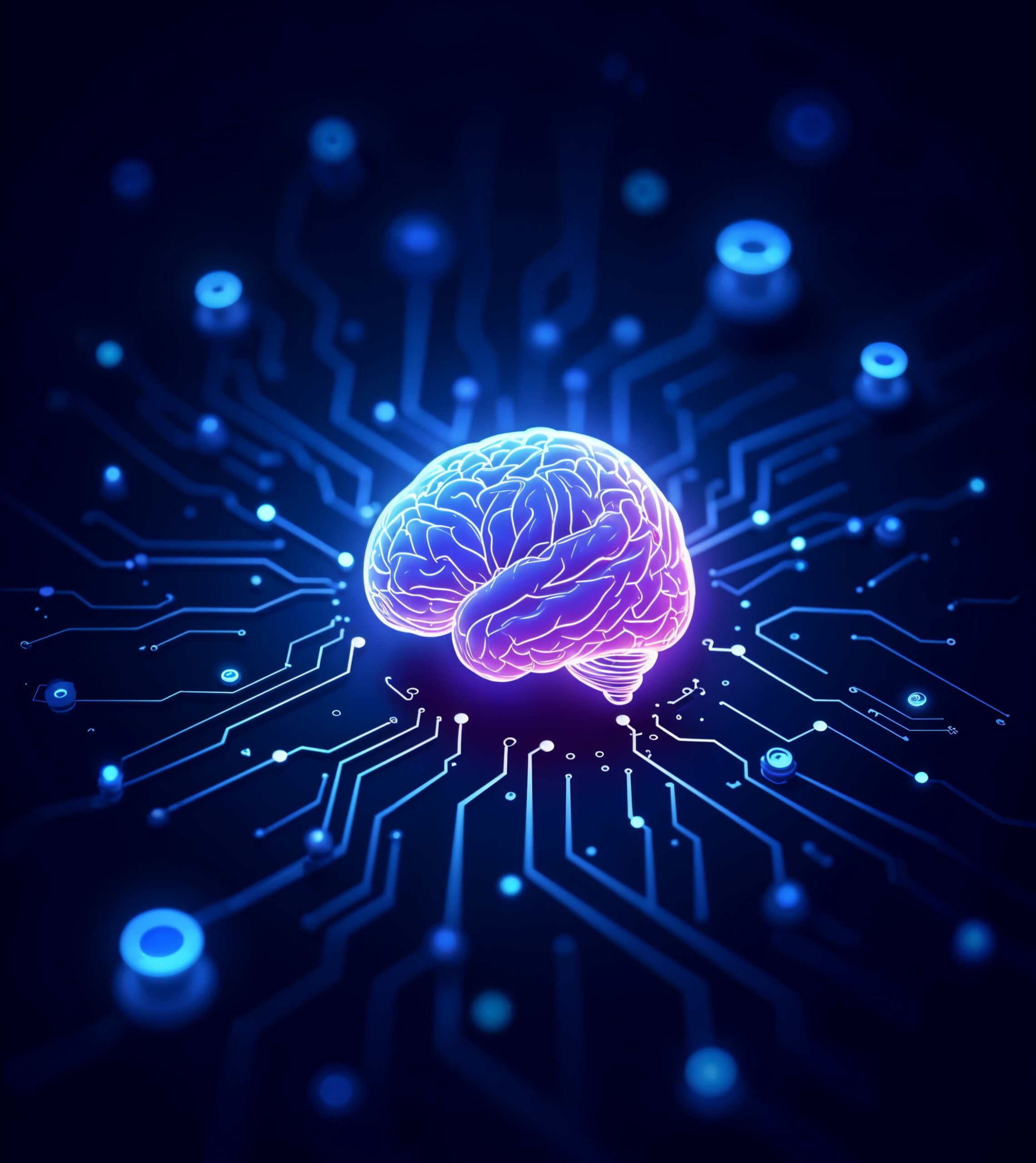AI medical diagnosis utilizes artificial intelligence to analyze medical data, enhancing the accuracy and speed of disease detection. This article delves into current applications of AI in medical diagnostics and its potential to transform healthcare.
Key Takeaways
– AI enhances medical diagnostics by swiftly analyzing patient data and medical images, leading to improved accuracy and reduced errors in disease diagnosis.
– AI’s application spans various medical fields, including cardiology and oncology, where it significantly improves the detection of conditions and supports personalized treatment plans.
– Challenges such as data privacy, algorithmic bias, and ethical considerations must be addressed to ensure the safe and effective integration of AI technologies in healthcare.
The Role of AI in Medical Diagnostics
The integration of artificial intelligence in medical diagnostics is a game-changer. AI technologies can enhance diagnostic processes by quickly analyzing medical images and patient data, providing healthcare professionals with invaluable insights. This capability is transforming traditional diagnostic methods, which often rely on manual interpretation and are prone to diagnostic errors.
AI processes vast amounts of data swiftly and accurately, revolutionizing disease diagnosis. Consistent, data-driven insights from AI improve diagnostic accuracy and reduce errors, enhancing patient care and supporting clinical decisions, which leads to better outcomes.
AI significantly aids clinicians in diagnosing diseases by analyzing patient data from multiple sources, providing a comprehensive understanding of health crucial for accurate ai diagnosis and treatment. An ai model for multimodal data analysis further enhances this capability by integrating information from various ai models, medical data sources, and medical diagnoses, and ai research.
Quantum AI is another frontier in medical diagnostics. It has the potential to process medical data more rapidly than traditional computers, leading to even faster and more accurate diagnoses. This advancement could be particularly beneficial in emergency settings where time is critical.
Transitioning to AI-driven diagnostic methods isn’t just about speed and accuracy; it involves making informed decisions that enhance patient care and support clinical decision-making. As AI evolves, its role in medical diagnostics will grow, improving patient outcomes and healthcare efficiency.
Enhancing Diagnostic Accuracy with AI Tools

AI tools are enhancing diagnostic accuracy across medical fields, significantly improving disease detection and patient outcomes. In cardiology, machine learning algorithms detect subtle abnormalities in echocardiograms that human analysis might miss, crucial for early diagnosis and treatment, ultimately improving outcomes.
Combining cardiovascular magnetic resonance imaging (CMR) with AI helps identify cardiac amyloidosis, a condition difficult to diagnose with traditional methods. AI automates the analysis of cardiac masses, aiding their detection, characterization, and monitoring, thus improving diagnostic accuracy and effectively managing cardiovascular diseases.
AI algorithms are being developed to assess coronary artery calcification (CAC) from non-gated chest CT scans, improving cardiovascular risk evaluation. This enables healthcare providers to better predict and prevent heart-related conditions, showcasing how AI technologies enhance diagnostic accuracy and patient care.
In oncology, AI applications in diagnostics have significantly improved the accuracy of detecting conditions like breast cancer. AI-powered tools analyze medical images with remarkable precision, identifying patterns that human eyes might miss, crucial for early detection and treatment, significantly improving patient outcomes.
AI’s use in medical diagnostics spans various fields, demonstrating its versatility and effectiveness. By enhancing diagnostic accuracy, AI tools support clinical decision-making, reduce errors, and ultimately contribute to improved patient outcomes.
Machine Learning and Deep Learning in Medical Imaging
The application of machine learning and deep learning in medical imaging is one of the most promising advancements in diagnostics. AI significantly improves diagnostic accuracy by utilizing algorithms to process and analyze imaging data, transforming how medical professionals approach disease diagnosis and treatment.
Convolutional Neural Networks (CNNs) are at the forefront of pattern recognition in medical imaging applications. These deep learning algorithms can analyze complex medical images, identifying patterns and abnormalities that might be missed by human interpretation. This level of detail is crucial for accurate diagnosis and effective treatment planning.
Machine learning algorithms automate the detection of abnormalities in medical images, enhancing clinical workflow efficiency and reducing the burden on medical professionals. Streamlining the diagnostic process allows healthcare providers to focus more on patient care and less on administrative tasks.
Deep learning frameworks develop advanced diagnostic tools that improve patient outcomes. These tools continuously learn from new data, leading to more accurate and reliable diagnoses over time, a significant advantage of AI in medical imaging.
AI’s ability to recognize complex patterns and analyze vast amounts of data is transforming medical diagnostics. Integrating AI into clinical workflows enhances diagnostic accuracy, supports clinical decision-making, and improves patient outcomes. As AI evolves, its impact on medical imaging will deepen, ushering in a new era in diagnostics.
Personalized Treatment Plans Through AI
AI is crucial in developing personalized treatment plans, transforming healthcare from a one-size-fits-all approach to tailored, patient-specific care. AI systems utilize patient-specific clinical data to enhance treatment decision-making, embodying personalized medicine where treatments cater to individual patient needs.
AI tools in healthcare offer the following benefits:
Predict patient responses to treatments, allowing healthcare providers to tailor plans accordingly
Improve outcomes and minimize adverse reactions
Analyze extensive datasets to identify patterns that enhance treatment plan accuracy
Lead to more successful and targeted therapies
AI is making significant strides in predictive modeling, reducing healthcare expenses by minimizing unnecessary treatments and hospitalizations, contributing to a more efficient healthcare system. In genomics, AI tailors treatment options based on an individual’s genetic profile, facilitating personalized medicine.
AI in personalized medicine overcomes traditional challenges by revealing complex patterns in patient data. Integrating a patient’s medical history, AI facilitates the creation of customized therapy regimens, ensuring treatments are effective and aligned with unique health needs.
The success of AI in personalizing treatment depends on the quality of individual patient data and algorithms used. As AI technologies evolve, their role in developing personalized treatment plans will grow, leading to successful treatment and improved patient outcomes and treatment outcomes, resulting in a more proactive approach to healthcare.
Predictive Analytics and Risk Assessment in Healthcare

Predictive analytics in health care detects potential health issues earlier, reducing the likelihood of severe outcomes. AI predictive analytics uses extensive patient data to improve risk assessment accuracy, enabling better clinical decisions. This transforms healthcare by facilitating proactive interventions and improving patient outcomes.
Machine learning algorithms in predictive analytics continuously learn from new patient data, enhancing their predictive capabilities over time. This ensures risk assessments are always up-to-date and accurate, providing healthcare providers with the necessary information for informed decisions.
In genomic medicine, AI predicts disease risk by analyzing genetic and lifestyle factors. This allows for personalized risk assessments and targeted interventions, improving patient outcomes and reducing the burden on healthcare systems.
Predictive analytics transform disease prediction and prevention by identifying patterns and enabling proactive interventions. Continuously examining factors like patient demographics, disease prevalence, and potential risk factors, AI algorithms predict outcomes for at-risk patients, supporting clinical decision-making and enhancing patient care and safety.
Integrating predictive analytics in healthcare organizations fosters proactive strategies, potentially leading to better health outcomes and cost savings. As AI technologies evolve, their impact on predictive analytics and risk assessment will grow, providing healthcare providers with the tools to improve patient outcomes and transform practices.
AI in Genomic Medicine
AI is transforming genomic medicine by enhancing genomic analysis and enabling personalized treatments. By integrating diverse data types, such as DNA sequences and RNA information, AI provides a holistic view of biological functions. This comprehensive analysis is crucial for understanding the genetic basis of diseases and developing targeted treatments.
Machine learning algorithms in genomic medicine identify genetic markers in real-time data and refine disease risk predictions. This allows for the recognition of complex genetic patterns, informing personalized treatment plans and improving patient outcomes.
AI enables personalized treatments through genomic analysis and mutation identification. Tailoring treatment options based on an individual’s genetic profile ensures therapies are effective and aligned with unique health needs, embodying personalized medicine’s core principle of patient-specific care.
Predictive analytics can forecast infectious disease outbreaks, aiding timely public health responses. This is crucial for managing crises and ensuring effective allocation of healthcare resources. As AI evolves, its impact on genomic medicine will grow, providing tools to improve patient outcomes and transform healthcare practices.
Addressing Challenges in AI Medical Diagnosis
Despite AI’s benefits in medical diagnostics, significant challenges need addressing. Data privacy concerns arise if patient data is shared without consent, jeopardizing trust. Federated learning is emerging as a solution, allowing privacy-preserving data sharing.
Robust cybersecurity measures are essential to protect sensitive health information from breaches and unauthorized access. Comprehensive cybersecurity strategies ensure patient data protection in AI healthcare applications. Without these measures, AI adoption in healthcare could be hindered by security concerns.
The lack of quality medical data and bias in AI design can hinder successful implementation in healthcare. Ensuring AI algorithms are transparent and free from bias is crucial for building trust among healthcare professionals and patients, allowing better understanding and acceptance of AI-driven diagnostic tools.
Integrating AI in healthcare systems requires multidisciplinary collaboration among technology developers, clinicians, and ethicists. This ensures AI technologies are designed and implemented to meet stakeholders’ needs and address AI medical diagnosis challenges.
Addressing these challenges ensures AI continues to play a transformative role in medical diagnostics, improving patient outcomes and enhancing healthcare system efficiency.
Legal and Ethical Considerations
Integrating AI into healthcare brings forth a myriad of legal and ethical considerations. The lack of established regulations for AI in healthcare increases the urgency to address algorithmic transparency and cybersecurity vulnerabilities. Without clear guidelines, AI systems risk being implemented without adequate oversight, potentially jeopardizing patient safety and trust.
Debate continues over whether existing legal frameworks can adequately address the unique challenges posed by AI in clinical practice. Establishing clear guidelines for ethical AI use can mitigate risks associated with algorithmic bias and data privacy, ensuring responsible and ethical use in healthcare settings.
Key ethical issues in AI healthcare applications include:
Informed consent
Transparency
Fairness
Data privacy
Ensuring patients are fully informed about how their data will be used and that AI systems are transparent in decision-making is crucial for maintaining trust. AI’s opaque decision-making processes may also hinder accountability when errors occur in clinical settings.
AI systems perpetuating biases from training data raises ethical implications for equitable healthcare delivery. Establishing guidelines and standards for AI algorithms ensures effective and ethical AI use in healthcare, safeguarding patient safety and ensuring AI technologies contribute positively to healthcare outcomes.
AI in Enhancing Patient Education and Reducing Provider Burnout
AI technologies are being implemented to lessen the administrative burdens that contribute to clinician burnout. By automating clinical documentation and transcribing patient interactions, AI allows healthcare providers to focus more on patient care and less on administrative tasks. This shift can significantly reduce the stress and burnout experienced by clinicians, leading to better health outcomes for patients.
AI scribes are being used in many hospitals to transcribe patient interactions, thus alleviating data entry pressure on providers. This automation not only improves the efficiency of clinical workflows but also enhances the quality of patient care through ai implementation by allowing providers to spend more time interacting with patients and utilizing an ai system.
The widespread use of AI in healthcare could potentially transform administrative practices and reduce clinician burnout. An AI tool called ‘Insightli’ has been launched to help streamline workflows and customize patient content for better education. By providing patients with tailored educational content, AI can enhance patient understanding and engagement in their own care, offering valuable insights into their health.
Provider burnout is a significant challenge in healthcare, often resulting from excessive administrative tasks and documentation pressures. By reducing these burdens, AI technologies can improve the well-being of healthcare providers and enhance patient care. As AI continues to evolve, its role in enhancing patient education and reducing provider burnout will only become more significant.
Future Directions for AI in Medical Diagnostics

The future of AI in medical diagnostics is bright, with numerous advancements on the horizon. The integration of quantum AI is anticipated to enhance the efficiency and speed of medical diagnostics by leveraging advanced computing capabilities. This technology could revolutionize how quickly and accurately diseases are diagnosed, leading to improved patient outcomes.
Multimodal data analysis in AI can lead to more accurate diagnoses by combining various types of patient information, such as imaging and bio-signals. This comprehensive approach provides healthcare providers with a holistic view of patient health, enabling more accurate and informed decision-making.
Ongoing research aims to improve the accuracy of artificial intelligence ai predictions and expedite the learning process to support healthcare sector staff effectively. These advancements will ensure that AI technologies continue to evolve and adapt to the ever-changing landscape of healthcare.
The potential for AI to revolutionize medical diagnostics is immense. By offering new insights and improving patient outcomes, AI can transform how diseases are diagnosed and treated. As we look to the future, the continued development and integration of AI technologies will be crucial for advancing medical diagnostics and enhancing patient care.
Summary
In summary, artificial intelligence is transforming healthcare by enhancing diagnostic accuracy, personalizing treatment plans, and providing predictive analytics. AI’s ability to analyze vast amounts of data quickly and accurately is revolutionizing medical diagnostics and improving patient outcomes.
We have explored the various applications of AI in medical diagnostics, from machine learning and deep learning in medical imaging to the role of AI in genomics and personalized medicine. Despite the challenges and ethical considerations, the potential for AI to revolutionize healthcare is undeniable.
As we move forward, the continued development and integration of AI technologies will be crucial for advancing medical diagnostics and improving patient care. By embracing these advancements, we can look forward to a future where healthcare is more efficient, accurate, and personalized.

Leave a Reply